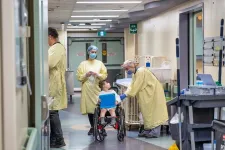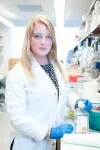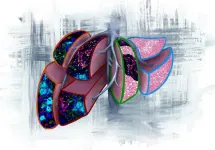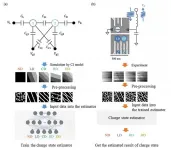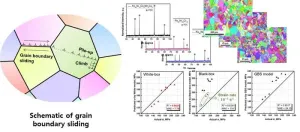(Press-News.org) When Michael Pirovolakis received an individualized gene therapy in a single-patient clinical trial at The Hospital for Sick Children (SickKids) in March 2022, the course of his condition was dramatically altered.
Michael has spastic paraplegia type 50 (SPG50), an “ultra-rare” progressive neurodegenerative disorder that causes developmental delays, speech impairment, seizures, a progressive paralysis of all four limbs, and typically fatal by adulthood. Approximately 80 children around the world are affected by this genetic condition.
In a bid to slow the progression of the condition, a clinical research team at SickKids administered a first single-patient gene therapy to Michael less than three years after his initial diagnosis.
Today, the groundbreaking clinical trial published in Nature Medicine documents Michael’s journey in the 12 months following the procedure, along with the novel impact this trial holds for the future of genetic medicine in Canada.
What is gene therapy?
Gene therapy is a way of delivering a healthy copy of a gene into the cells of a person who has a faulty gene(s). In Michael’s case, SPG50 is caused by two pathogenic variants in a gene called AP4M1.
Led by Dr. Jim Dowling, Staff Physician in the Division of Neurology and Senior Scientist in the Genetics & Genome Biology program at SickKids, the clinical research team delivered the healthy AP4M1 gene into Michael's spinal fluid, which carried the gene directly to the nerve cells.
“While these ultra-rare diseases are unique, our workflow provides a road map for gene therapies that could help many of the thousands of children in Canada with rare genetic conditions,” says Dowling.
Thanks to a multi-center collaboration with doctors and companies in the U.S. and Canada to coordinate the research, development, and manufacturing of a gene replacement therapy, the team were, remarkably, able to administer the gene therapy treatment to Michael within three years of diagnosis.
Michael’s journey
In the 12 months after he received the treatment, Michael experienced no serious side effects and, contrary to the hallmark of neurodegenerative conditions like SPG50, his condition does not seem to be progressing further.
He also began to show potential signs of improvement. For the first time, Michael was able to stand with his heels on the ground. He also experienced improvements in some aspects of his neurodevelopment.
“When we heard that Michael had been diagnosed with this terrible disease, our world fell apart. We were lost and broken as a family,” says Michael’s parents, Terry and Georgia. “Thankfully, we had an amazing team at SickKids and a supportive community that lifted us up and gave us the confidence to raise millions of dollars and create a therapy, not only for Michael, but for other children affected by this disease for generations to come.”
The future of gene therapy in Canada
The clinical research team continues to follow Michael's progress, but the trial provides important initial evidence of the safety and efficacy of gene therapy to reduce or halt the progression of SPG50.
Importantly, the results also highlight how gene therapy can be developed quickly and personalized for individual patients with rare genetic conditions. They hope that this approach can be used for other conditions in the future to help achieve Precision Child Health, a movement at SickKids to deliver individualized care for every patient.
“There are over 10,000 individual rare diseases and most are without therapy,” says Dowling. “We are providing a blueprint that, with adequate funding and support, has the potential to change the lives of patients with rare diseases and a future where every child can benefit from precision medicine.”
This research was supported by the Precision Child Health initiative at SickKids and the SickKids Foundation. Funding from the CureSPG50 Foundation supported the therapy development, including manufacturing and preparation.
END
Gene therapy halts progression of rare genetic condition in young boy
2024-06-28
ELSE PRESS RELEASES FROM THIS DATE:
New predictors of metastasis in patients with early-stage pancreatic cancer
2024-06-28
Researchers at Weill Cornell Medicine with an international team have used liver biopsies to identify cellular and molecular markers that can potentially be used to predict whether and when pancreatic cancer will spread to an individual’s liver or elsewhere, such as the lung.
The study, published on June 28 in Nature Medicine, proposes that information from a liver biopsy—a small tissue sample collected for lab analysis—when pancreatic cancer is diagnosed may help guide doctors in personalizing treatment, such as liver-directed immunotherapies, before cancer cells have the chance to metastasize.
Only 10 percent of people with pancreatic ...
Climate change to shift tropical rains northward
2024-06-28
A study led by a UC Riverside atmospheric scientist predicts that unchecked carbon emissions will force tropical rains to shift northward in the coming decades, which would profoundly impact agriculture and economies near the Earth's equator.
The northward rain shift would be caused by complex changes in the atmosphere spurred by carbon emissions that influence the formation of the intertropical convergence zones. Those zones are essentially atmospheric engines that drive about a third of the world’s precipitation, Liu and his co-authors report in a paper published Friday, June 28, in the journal Nature Climate Change.
Tropical ...
City of Hope study suggests changing the gut microbiome improves health outcomes for people newly diagnosed with metastatic kidney cancer
2024-06-28
LOS ANGELES — Physician scientists from City of Hope, one of the largest cancer research and treatment organizations in the United States, found that people with metastatic kidney cancer who orally took a live biotherapeutic product called CBM588 while in treatment with immunotherapy and enzymatic tyrosine kinase inhibitors experienced improved health outcomes. The phase 1 trial was published today in Nature Medicine.
Microorganisms in the gut modulate the immune system. City of Hope researchers are now in discussions with the global SWOG Cancer ...
Surprising meteorite impact rate on Mars can act as ‘cosmic clock’
2024-06-28
Seismic signals have suggested Mars gets hit by around 300 basketball-sized meteorites every year, providing a new tool for dating planetary surfaces.
The new research, led by scientists at Imperial College London and ETH Zurich working as part of NASA's InSight mission, has shed light on how often ‘marsquakes’ caused by meteorite impacts occur on Mars.
The researchers found that Mars experiences around 280 to 360 meteorite impacts every year that produce craters larger than eight metres in diameter and shake the red planet’s ...
Air pollution exposure during childhood linked directly to adult bronchitis symptoms in new research
2024-06-28
A new study brings fresh revelations about the connection between early-life exposure to air pollution and lung health later in life. A research team led by the Keck School of Medicine of USC has shown that exposure to air pollution during childhood is directly associated with bronchitis symptoms as an adult.
To date, many investigations in the field have established intuitive links that are less direct than that: Air pollution exposure while young is consistently associated with lung problems during childhood — and childhood lung problems are consistently associated with lung issues as an adult.
The current study, published in the American Journal of Respiratory ...
Kids given ‘digital pacifiers’ to calm tantrums fail to learn how to regulate emotions, study finds
2024-06-28
Children learn much about self-regulation – that is affective, mental, and behavioral responses to certain situations – during their first few years of life. Some of these behaviors are about children’s ability to choose a deliberate response over an automatic one. This is known as effortful control, which is learned from the environment, first and foremost through children’s relationship with their parents.
In recent years, giving children digital devices to control their responses to emotions, especially if they’re negative, has ...
No evidence that England’s new ‘biodiversity boost’ planning policy will help birds or butterflies
2024-06-28
A new legal requirement for developers to demonstrate a biodiversity boost in planning applications could make a more meaningful impact on nature recovery if improvements are made to the way nature’s value is calculated, say researchers at the University of Cambridge.
From 2024, the UK’s Environment Act requires planning applications to demonstrate an overall biodiversity net gain of at least 10% as calculated using a new statutory biodiversity metric.
The researchers trialled the metric by using it to calculate the biodiversity value of 24 sites across England. These sites have all been monitored over the long-term, allowing the team to compare biodiversity ...
Visual explanations of machine learning models to estimate charge states in quantum dots
2024-06-28
A group of researchers has successfully demonstrated automatic charge state recognition in quantum dot devices using machine learning techniques, representing a significant step towards automating the preparation and tuning of quantum bits (qubits) for quantum information processing.
Semiconductor qubits use semiconductor materials to create quantum bits. These materials are common in traditional electronics, making them integrable with conventional semiconductor technology. This compatibility is why scientists consider them strong candidates for future ...
The future of metals research with artificial intelligence
2024-06-28
A research team led by Professor Hyoung Seop Kim from the Graduate Institute of Ferrous & Eco Materials Technology and the Department of Materials Science and Engineering and Jeong Ah Lee, a PhD candidate, from the Department of Materials Science and Engineering, in recent collaboration with Professor Figueiredo from Universidade Federal de Minas Gerais's Department of Metallurgical and Materials Engineering in Brazil, has developed an optimal artificial intelligence model to predict the yield strength of various metals, effectively addressing traditional cost and time limitations. This research has been published in the online edition of Acta Materialia, an ...
Tissue bridges are reliable predictors of recovery from cervical spine injuries
2024-06-28
The results of the longitudinal study “Prognostic value of tissue bridges in cervical spinal cord injury” have the potential to change clinical practice. They have just been published in The Lancet Neurology, the world’s leading journal of clinical neurology. The team led by lead author Dr. Dario Pfyffer and senior author Prof. Dr. med. Patrick Freund from Balgrist University Hospital and the University of Zurich, which includes SCI experts from around the world, has successfully developed models that incorporate tissue bridges in the spinal cord in a large, multicenter cohort of patients with cervical SCI for improved prognosis of clinical outcomes. These ...
